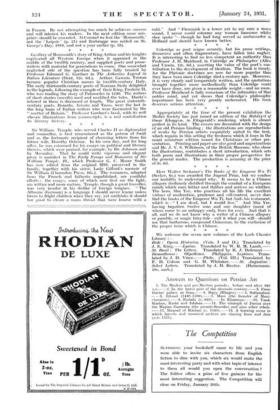Herr Walter Seckauer's The Books of the Emperor Wu Ti
(Seeker, 6s.) was awarded the Jugend Prize, but we confess our inability to understand why. It seems to be a Chinese allegory (tediously distilled through the conduit of a European mind) which runs hither and thither and arrives no whither. The hero, Shu Yee, who practises all his life the excellent virtues of moderation, prudence and self-control, never does find the books of the Emperor Wu Ti, but finds his testament, which is—" I am dead, but I would live." And Shu Yee, having begotten • twelve sons and one daughter (most of whom come to an unhappy end), lives for ever. And that is all, and we do not know why a writer of a Chinese allegory or parable, or magic fairy-tale—call it what you will—should use that barbarous, compound Chinaman; to the exclusion of the proper term which is Chinese. * **






































 Previous page
Previous page